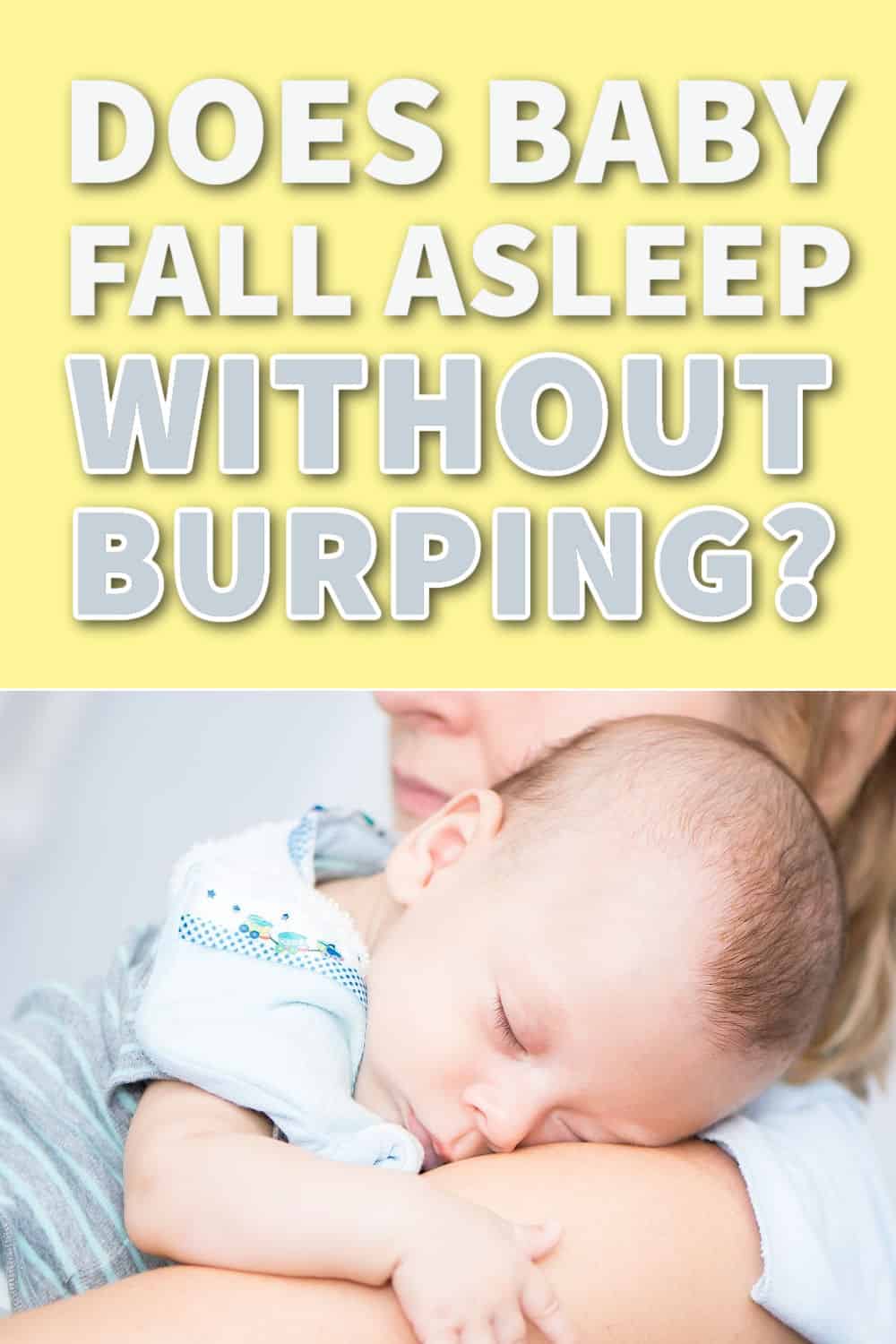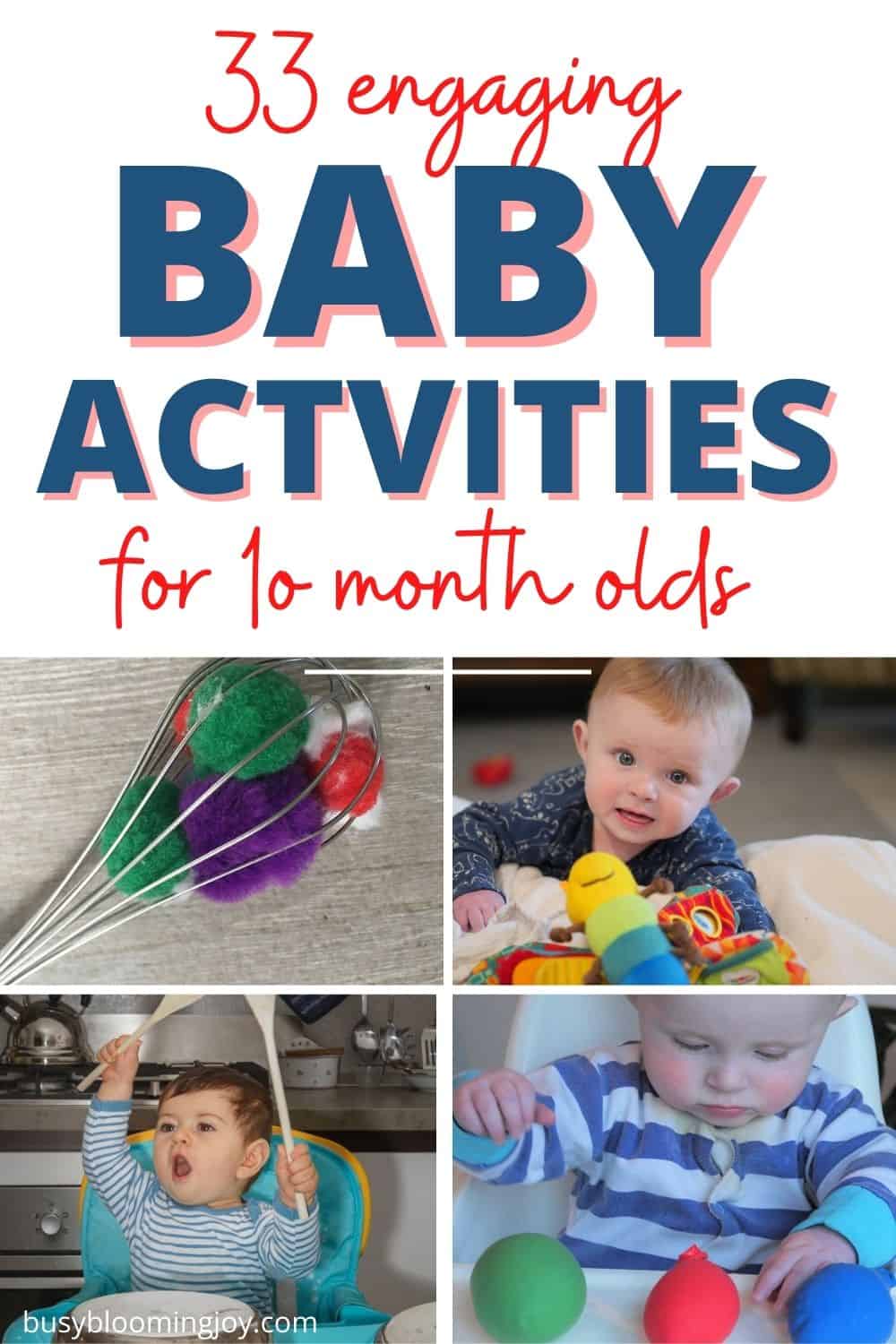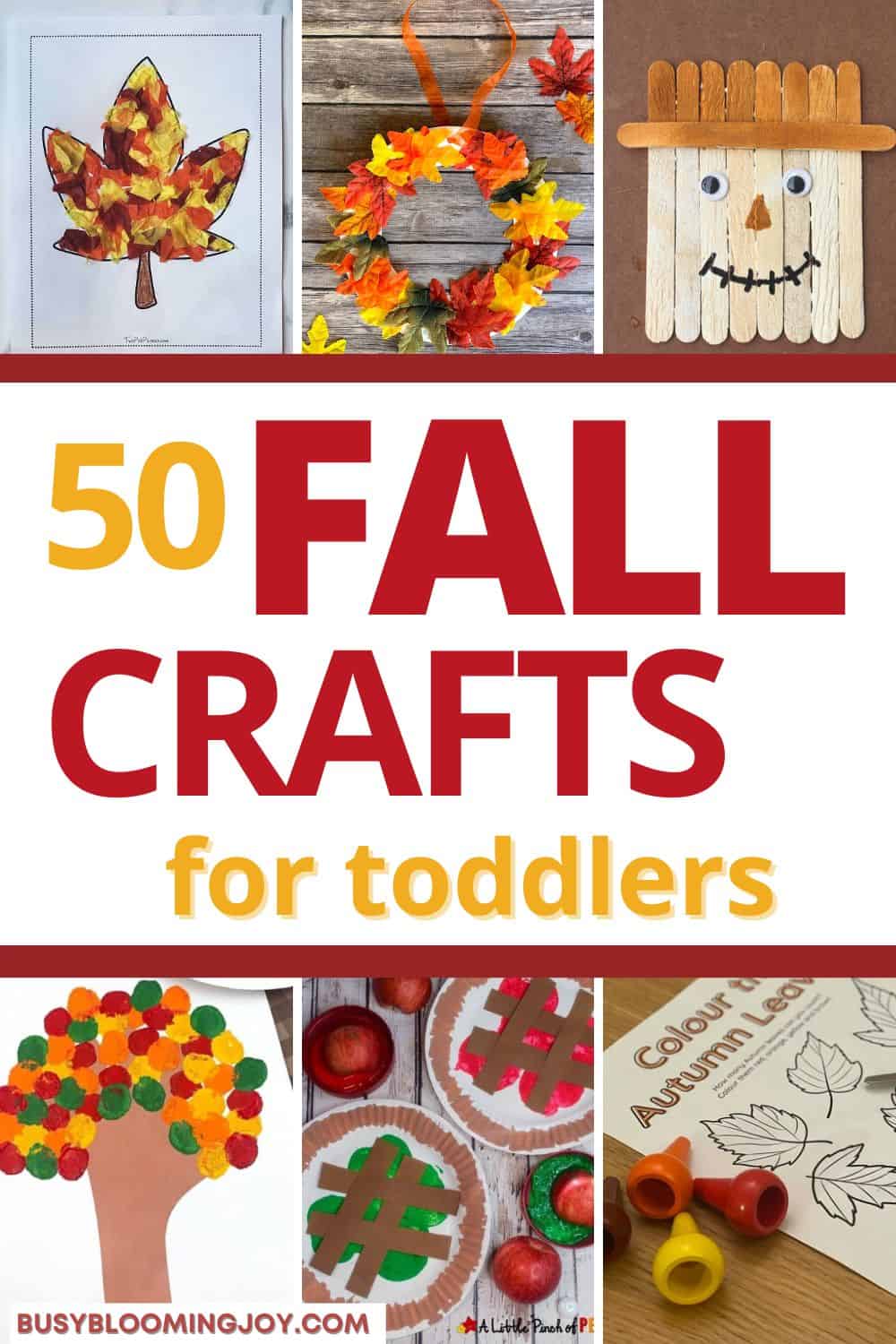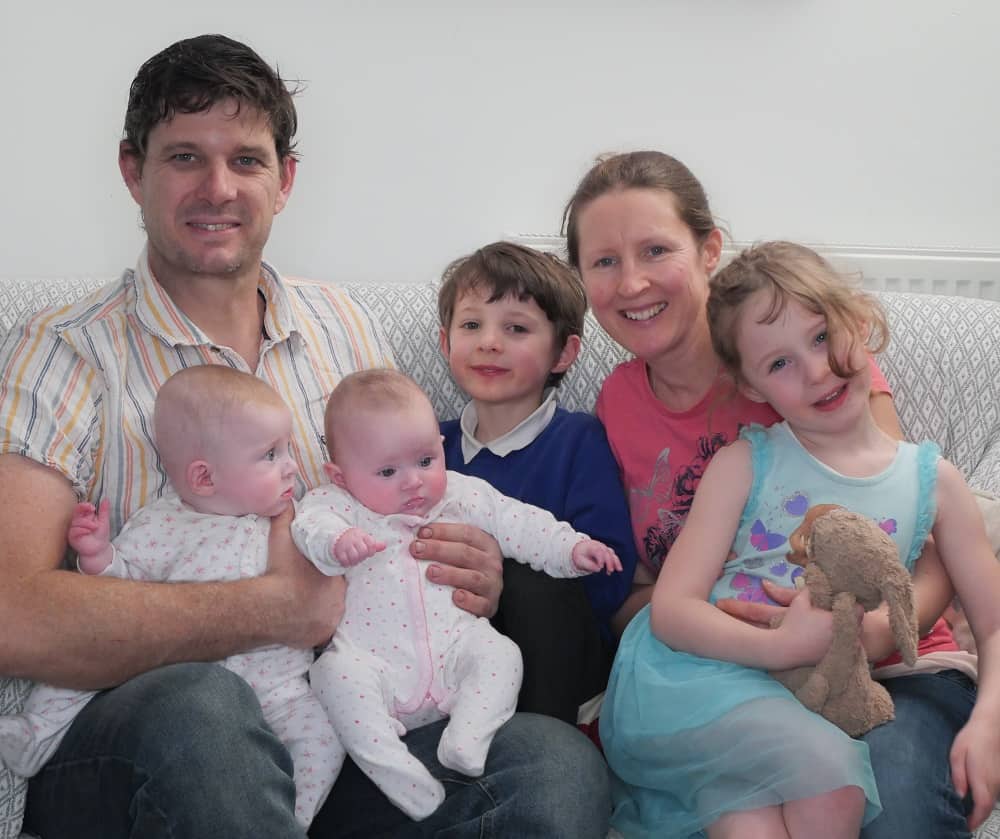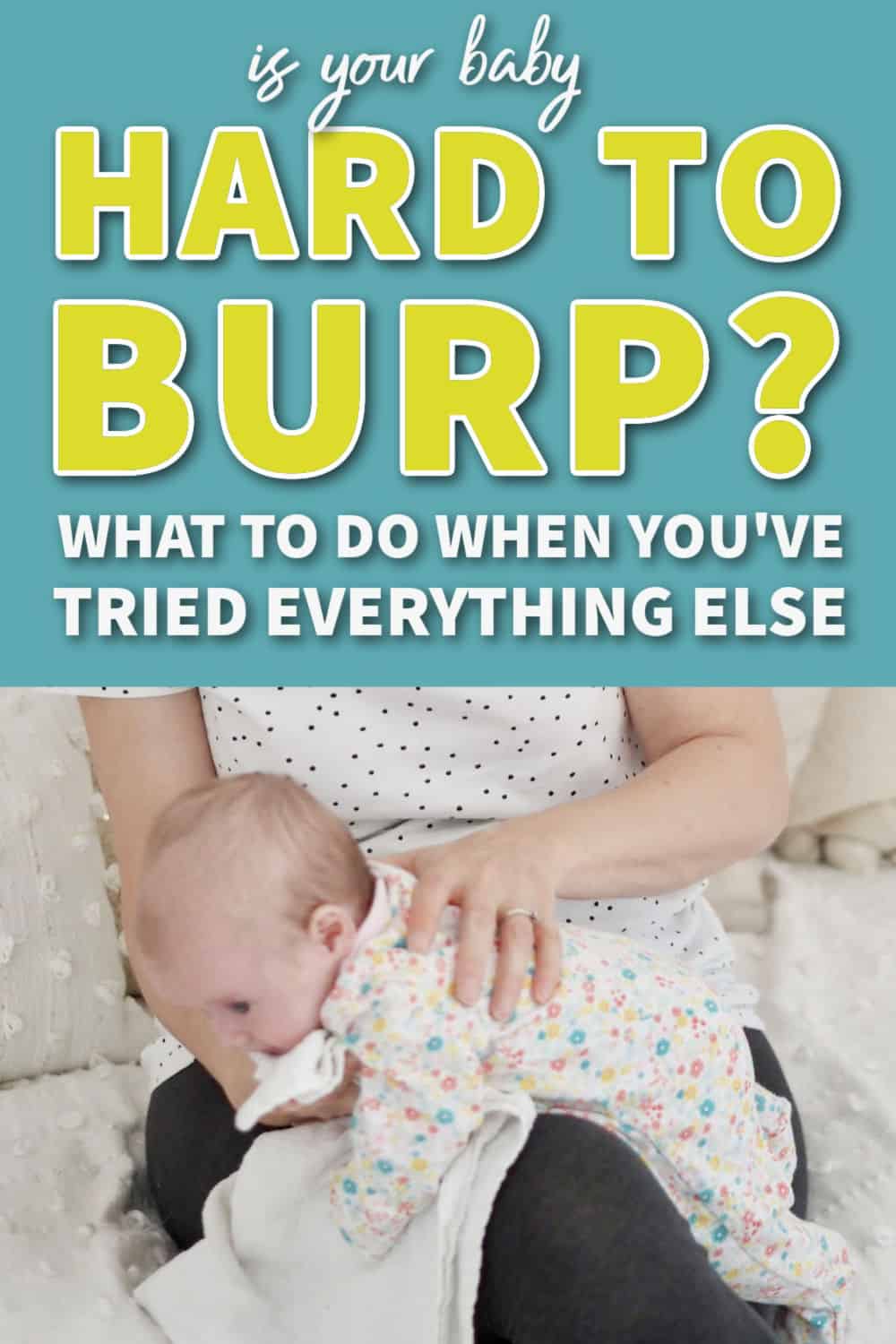It’s hard enough dragging yourself out of bed to feed your hungry newborn at night; then there’s the burping when they’re done eating. I battled to burp my babies after those night feeds. In the day too. Tiny babies can’t stay awake very long before needing to asleep; they have short awake times. More often than not, by the end of the feed my newborns were quietly dosing, bottle teat or nipple still in mouth.
First time around, I was stumped. Is it OK to put baby to sleep without burping? Or should I be figuring out how to burp a sleeping baby?
Well, 4 babies later I can tell you: “yes” and “yes”. Confused? That does seem a little contradictory, doesn’t it?! Hopefully, by the end of this post, things will be a lot clearer when it comes to all things sleeping and burping your newborn.
Table of Contents
ToggleWhat happens if a newborn doesn’t burp?
Babies need to be fed, they need help settling to sleep, they often need help pooping! So it’s no surprise that they need help releasing all the air they ingest while eating, by being winded or burped; we all know that we need to burp our babies. Or do we? Just like lots of things baby, opinion is divided with some experts going as far as to say it’s not necessary to burp your newborn at all (with one study to support this).
Well, my experience with my newborns is that burping after a feed has been absolutely necessary; my second born was the trickiest and struggled big-time with reflux. Not burping her sufficiently made all her symptoms worse.
Excess gas due to a lack of burping can also be one of the causes of colic and those fussy evenings, aka The Witching Hour.
So what happens exactly if you can’t get a baby to burp?
Perhaps nothing at all – may be your newborn is a great eater and hardly takes any air in.
Perhaps nothing for a while, and then a massive belch when you’re least expecting it pops out, with or without a load of milk. (This is my third-born if I can’t him to burp…)
Another possibility is lots of wriggling and writhing, refusal to feed, crying, general irritability, clenched fists, flailing arms and legs, stiffness and tension. Sounds like colic, right? These are all signs your baby needs to burp.
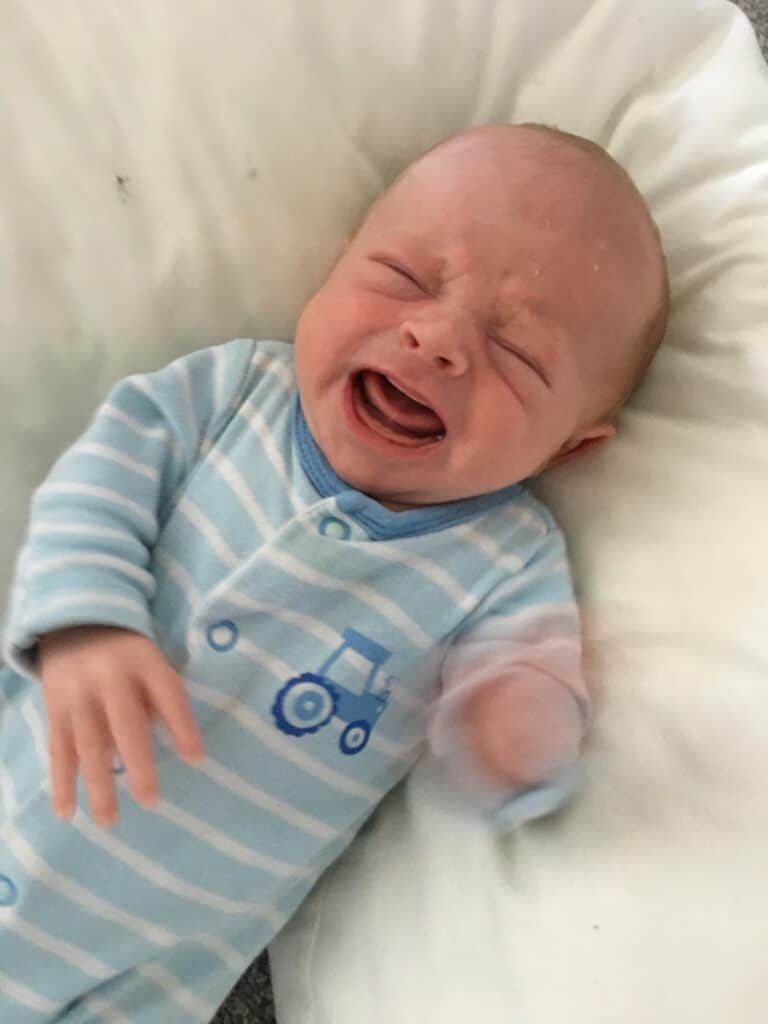
If you can’t get a burp up when your baby is showing those signs of trapped wind, gas bubbles will be forced down into the lower gut causing more discomfort – and then that wind will have to come out the other end…
Related post: 6 newborn baby cues you need to know: understanding baby cues (printable chart!)
Burping a newborn after breastfeeding
Babies tend to take in less air while breastfeeding as they can make a better seal on a human nipple versus a bottle teat. This means they’re normally less gassy and may not need to burp – but again, expert opinions are mixed.
So if a newborn doesn’t burp after breastfeeding, there is the possibility that they don’t need to. But by offering your baby the chance to burp, for example, by holding them in a good burping position, you can’t really go wrong.
What happens if a newborn doesn’t burp before sleeping?
Well, the answers aren’t all that different to the above, so firstly, there’s a chance your newborn will be just fine.
However, if your baby normally burps after eating, lying her flat on her back too soon (because she’s asleep) means that the chance of spit up is high if a burp does pop up. (Babies have a liquid diet and the valve that is meant to keep milk in the tummy takes a while to strengthen.) So if you do nothing else, holding your newborn upright is the way to go.
Another option is that the trapped wind may cause discomfort while your baby sleeps, which could be enough to wake your newborn during the lighter, more easily disturbed stages of the sleep cycle. Definitely, something you want to avoid.
Baby wakes up crying?
If your baby wakes earlier than normal and cries or shows other signs of gas, you may find that as soon as you pick her up, she burps. If not, try to burp your baby.
Is it OK if baby doesn’t burp before falling asleep?
Well, nothing catastrophic will happen, but if your baby normally burps after eating, it’s safe to say they’d be better off burping either before falling asleep or while asleep. That way you will avoid excess spit-up and your baby waking early due to gas.
If baby doesn’t burp before falling asleep, you’re best off learning how to burp a sleeping baby, which we’re coming to in just a minute.
Can baby choke if not burped before sleeping?
The advice used to be to sleep babies on their front, to avoid choking. It’s now known that babies have an extremely good gag reflex and will either spit out or swallow anything that comes back up. Not pleasant, but totally safe. So while babies may spit-up if not burped before sleeping, they won’t choke. This is why the current advice is to sleep babies on their back; back sleeping is the most important factor in reducing the risk of SIDS. (Check out the full list of Safe Sleep guidelines here).

Can a baby burp while sleeping?
Newborns can burp while sleeping, although it can be a little trickier. Just like it is OK to put baby to sleep without burping, but better to do so, if you’re wondering should I burp baby if sleeping, the answer is the same: if possible, yes.
Burping a sleepy or sleeping newborn after night feeds
The one big advantage of those long arduous night feeds, is that they are so long and so slow. Even slower than day feeds… (Don’t they just take forever with tiny babies?!) Eating at this slower pace, means your baby will take in less air and be less gassy… This means that, although burping a sleeping newborn might be harder, you don’t need to try for the same number of burps as in the day. (Silver lining?!)
So whereas there wasn’t a day feed that went by without the need to burp, when it came to night feeds, I sometimes did put my babies down asleep without burping them.
Can I feed a sleeping baby without burping them?
If your baby is asleep when eating, they’re also going to be asleep when you’d normally burp them. So this will be the case if you like to “Dream Feed” your baby.
If you’ve been on my site before you’ve probably noticed that I love a bit of routine with my littles. Starting as soon as they’re able to go 3 hours between feeds, I’ve followed this newborn sleep schedule with my babies. Part of this routine involves a “Dream Feed” at around 10 pm, so-called because you feed your baby while they’re in a dream-like state. I.e. barely conscious. (However, in the early days you will want to properly wake baby to ensure they take a decent feed).
Again, although we’ve established it’s fine to put baby to sleep without burping, it’s preferable if you can get some burps out first. Or at least give them that chance. So if you’re wondering whether to feed a sleeping baby without burping them, you can, but it’s better if you do burp them.
Can I feed a baby to sleep without burping?
I’ve always tried to avoid feeding my babies all the way to sleep, instead aiming to put them down sleepy, but still awake. (This is one of the keys to helping your baby learn to self-soothe and sleep through the night). But with the chaos of general life, I’d often pause feeding to do something for a minute or two, which ended up being 10, and then finish feeding. Now because newborns can’t stay awake for very long, often that mean finishing the feed when baby was just about ready for a sleep. Under these circumstances, feeding to sleep is hard to avoid.
(To avoid that feeding to sleep association from developing, if I could, I’d try to ensure baby was just a tiny bit awake before putting them down. But what I didn’t want to do was start burping them and wake them up fully.
So instead, I’d make sure baby was well burped before starting the remainder of the feed. When they’d finished eating, I’d then try to burp them while sleeping, but if unsuccessful, I’d be content any gas was minimal.
How to burp a sleeping baby
Here are the best ways to burp a sleeping baby.
#1 Burp as normal, just more gently
If your baby has taken a good feed and fallen fast asleep, you may not need to do much to burp them; your normal burping position may work just fine. You just need to be a little more gentle when moving them around, as sometimes the wind can come up quickly, all at once, possibly bringing up lots of milk. So keep movements slow and gentle.
If your baby is harder to burp, which can be the case if asleep, then stick with the principles of burping a hard to burp baby:
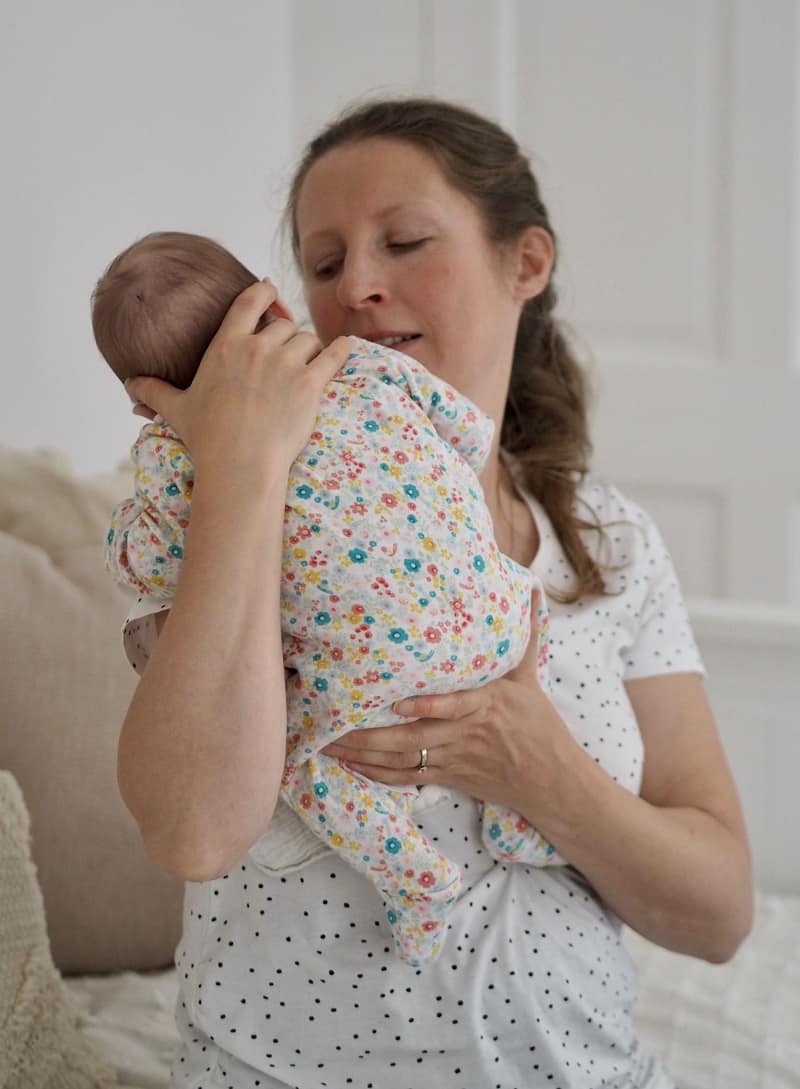
#2 Hold baby in a position that puts pressure on the abdomen
The typical over the shoulder burping position does little more than hold baby upright. If you’re struggling to burp your baby, hold them much higher up, so their body is lying more horizontal. This will put pressure on their tummy and abdomen and help move gas bubbles up and out.
#3 Rub and squeeze, don’t pat
Rather than patting your baby, rub baby’s back firmly from the base of the spine all the way up to the neck, as if you’re literally trying to squeezing those bubbles up and out.
#4 Put down, pick up
Definitely try the above 3 first – if you put your baby straight down after a lot of milk, it could come straight back up. But when you’ve been trying to burp your sleeping baby for a few minutes already and she still won’t burp, try laying her down on her back for a few minutes. Then simply pick her up and hold her upright. Moving your baby from vertical to horizontal and back to vertical can often be enough to get those air bubbles moving. This often worked well with my babies and I’d find that as soon as I picked them back up, a burp would pop straight out.
#5 Add in some movement
If your feeding chair rocks, you can simply have your baby lying on her front on your chest, so she’s on an incline, then rock her in the chair.
Another position that’s easy to try and burp your sleeping baby in while you’re sitting (preferable when it’s the middle of the night and you’re exhausted), is to hold baby in a sitting position on your lap, facing either left or right. Cup her chin with one hand, to support her head, and put your other hand on her back. Then gently move your baby up and down by moving the leg she’s sitting on, or rotate her upper body in a circular motion.
This last option does require you getting up, so if your baby isn’t particularly gassy at night, then I’d skip this one and move to #6. Try holding your baby in the “colic carry” (baby lying over your forearm, your hand holding them in the crotch) and gently move your arm back and forewards
#6 Simply hold baby upright for a minimum of 5 minutes
If all else fails, just holding your baby upright will give all that milk chance to settle and give gas bubbles a chance to resurface. I’d recommend 10-15 minutes, but even 5 minutes would help.
My favorite burping positions for a sleeping baby
Whether in the day or at night, if my babies were sleeping, either because they’d fallen asleep before burping or I’d dream fed them (i.e. while very sleepy or asleep) and weren’t particularly gassy, I’d try and burp them in a way that needed as little effort as possible. So ideally that’s sitting down and not having to move.
So below are my favorite positions for burping a sleeping baby:
- The newborn shoulder hold, with baby up and over the shoulder, as mentioned earlier
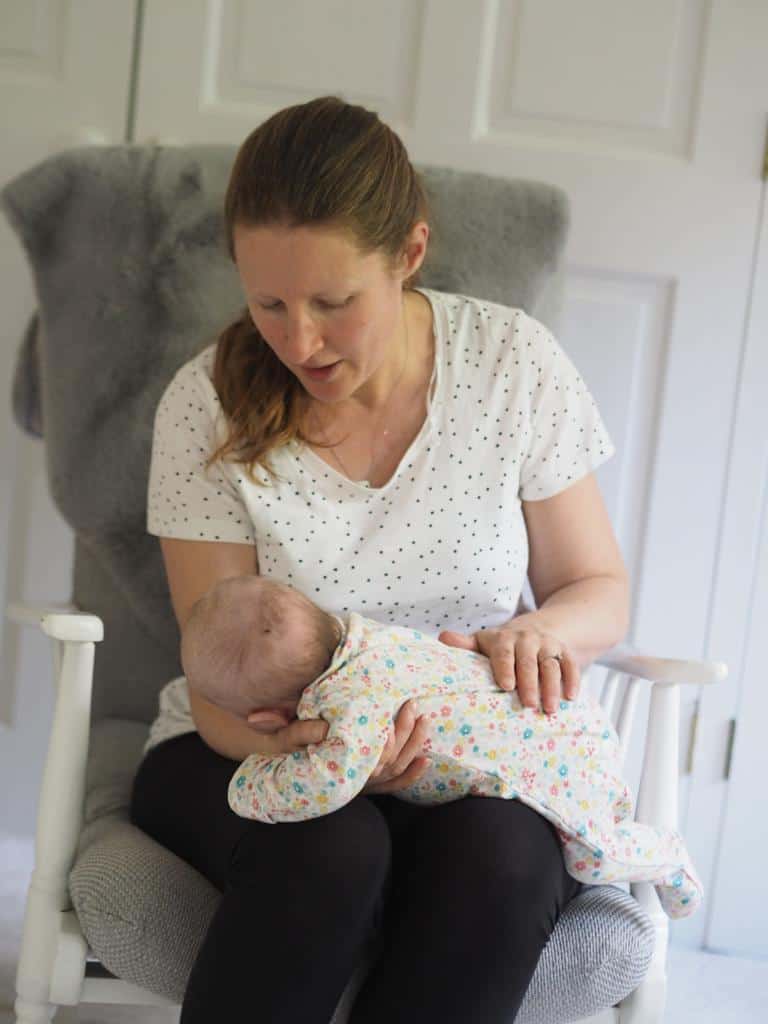
- Baby on her front on my lap, as in the picture above (think tummy time but on your lap). Then I’d rub baby’s back with my free hand.
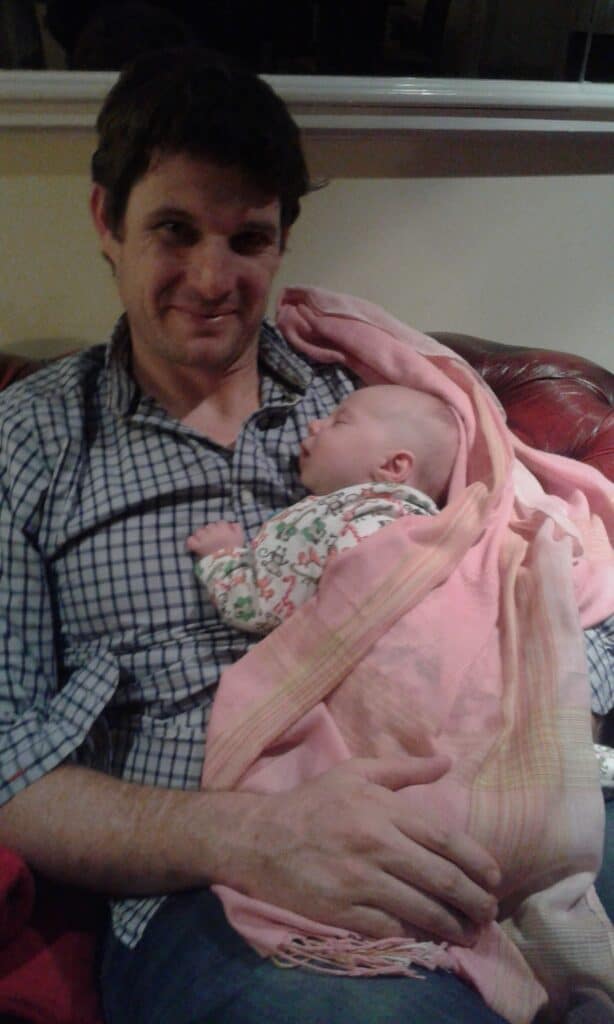
- Sitting semi-reclined, leaning quite far back in a chair or in bed, with baby on their front on my chest, as demonstrated by my husband in the picture above. Then I’d firmly and rhythmically rub baby’s back from bottom to top. If nothing else, this at least holds baby upright, giving the milk time to settle.
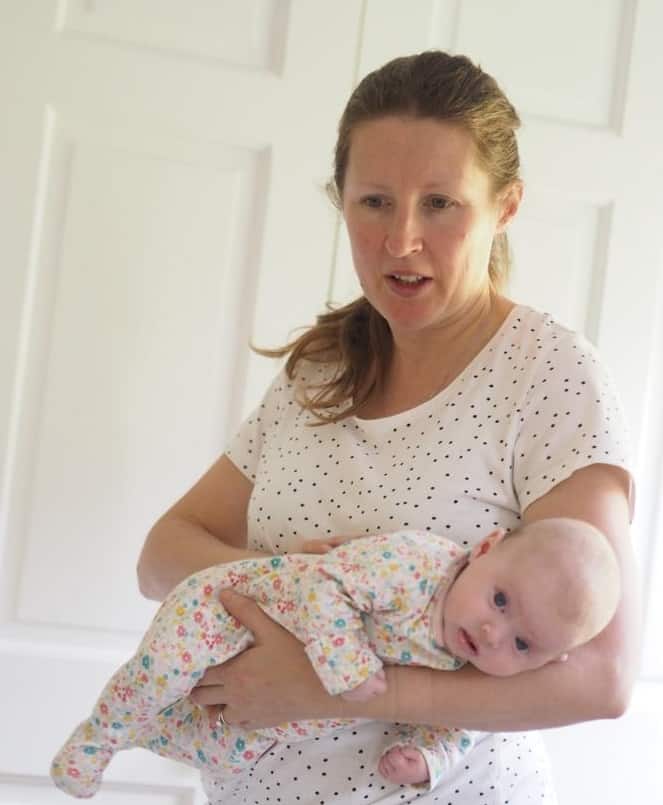
- Holding baby in the “colic carry” (see photo above), but sitting down. So baby lying over left right forearm, my left hand holding the crotch. Baby’s legs between my legs. Right hand rubbing back.
When to stop burping baby at night
As babies grow and develop they become better at eating, both more efficient and quicker. This means they also swallow less air, are less gassy and need less burping. If you’re wondering exactly when to stop burping baby, then of course it will depend on your baby. As soon as babies are able sit unaided, which can happen from 6 months (source), the need to burp rapidly declines.
However, you may be able to stop burping baby at night a few weeks earlier, due to the slower, less gassy nature of night feeds.
Don’t fret if your baby doesn’t burp before falling asleep, try burp them while sleeping
Your newborn may be just fine if she doesn’t burp before sleeping, particularly if you’re breastfeeding and your baby isn’t that gassy, so panic not. But if you can burp your sleeping baby, this could help avoid baby waking early or being uncomfortable due to gas. Just give it a go, you’ve got nothing to lose.


